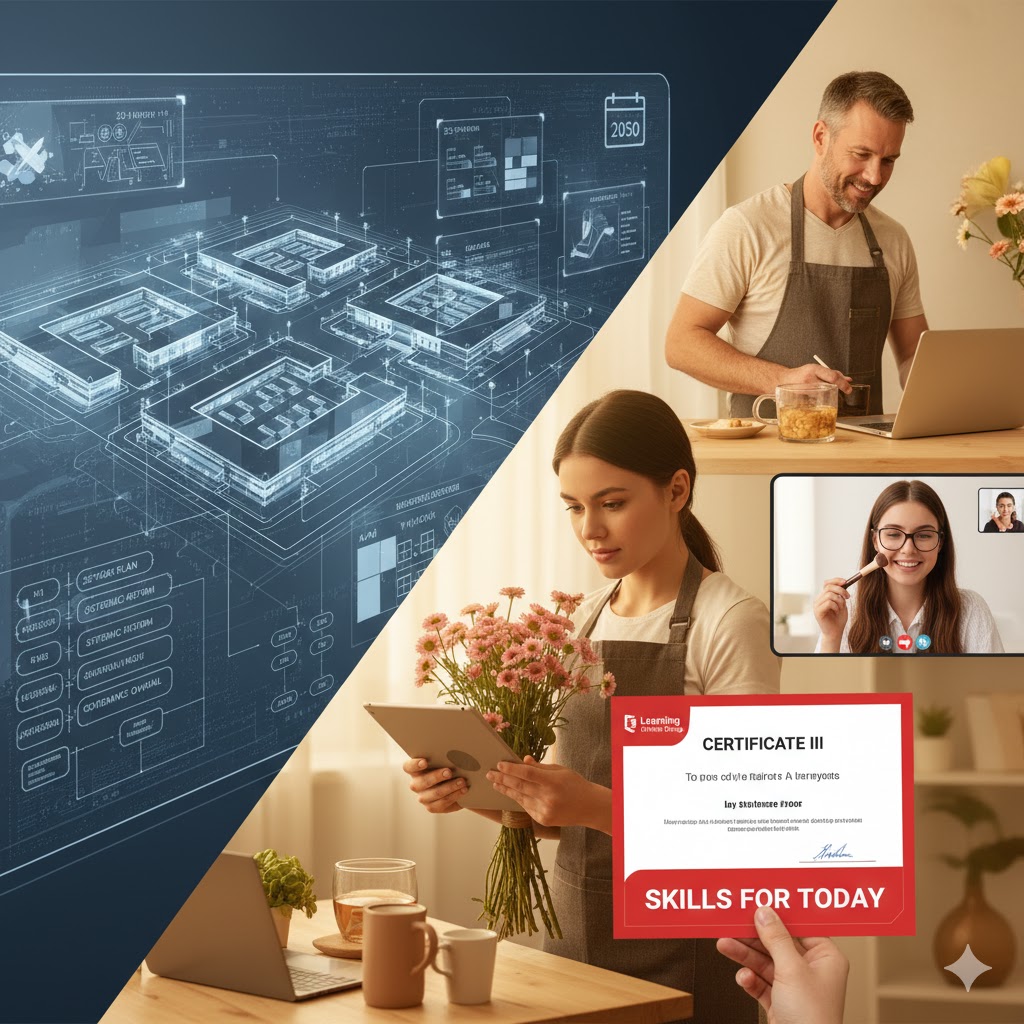Why Hands-On Skills and Human Tutors are the Only Cure for the AI Echo Chamber
The higher education sector is navigating a crisis of authenticity. The exponential rise of Large Language Models (LLMs) like ChatGPT has not just changed how students learn—it has fundamentally compromised the very mechanism by which we measure knowledge: the written submission. As the academic world scrambles to secure the integrity of its degrees, one profound truth is becoming undeniable: the future of high-value, skills based education continues to be analogue.
While Universities continue to struggle through the sameness of AI driven submission, skills based higher learning has entered an Assessment Renaissance. It’s here that the highest forms of achievement and confirmation of learning is no longer measured by perfectly polished essays but by demonstrable, practical, and human-verified skills. For institutions committed to graduate employability, this shift isn’t a problem; it’s a long-overdue recognition that they are more fit for purpose than ever.

The Crisis of the ‘AI Echo Chamber’: Why Bell Curves are Breaking
For decades, the standard essay and take-home assignment served as the benchmark for evaluation. Today, AI can generate highly coherent, well-structured, and contextually relevant submissions within seconds. This has created two systemic problems for traditional institutions that relied on written submission since their dawn:
1. The Death of Distinction
When every student has access to an AI assistant capable of producing an ‘A-grade’ quality paper (as measured by standard rubrics), the bell curve of achievement is flattened. Submissions become hyper-similar, sharing common arguments, structures, and even specific phrases derived from the AI’s probabilistic language model. As Shahper Richter and Patrick Dodd from the University of Auckland have so eloquently described in a recent submission to The Conversation, “it’s time to bring back oral tests,” to counter the futility of trying to detect AI submissions over genuine learning.
In this “AI Echo Chamber,” genuine learning outcomes are obscured. It becomes nearly impossible for an educator to reliably distinguish the student who genuinely synthesized complex information from the one who mastered the art of the perfect LLM prompt.
2. The Collapse of Standardisation
The bell curve, or standardised grading, relies on the premise of a normally distributed cohort ability. If a cohort’s achievement is artificially inflated due to AI use, the standard deviation collapses. The mechanism used to fairly separate high-achievers from competent performers is broken. When AI allows the majority of students to achieve technical competence instantly, the only reliable way left to bell curve or standardise grading is through assessment that AI cannot complete or replicate in real-time.
If we continue down this path, employers face hiring the best prompt engineers, rather than skilled employees, essentially creating an on-the-job training atmosphere which has a devastating effect on first year employment productivity.
To protect our productivity we need to force a necessary and vital change into our higher education systems: abandoning assessments that measure product (the essay) in favour of those that measure process and performance (the skill).
And we need to do it quickly! We don’t need LLM experts, we need skilled workers, particularly in the service based industries that underpin small to medium businesses across Australia.

The Inevitable Pivot: Why Practical Assessment is the New Gold Standard
The solution to the AI crisis is not a new form of software but a commitment to human interaction and performance-based learning. Recent research and academic commentary strongly support a pivot to practical, hands-on assessment methods:
1. Oral and Real-Time Verification
As noted in research discussing the re-emergence of analogue assessment, institutions across the US are already reverting to handwritten tests and oral assessments to ensure academic integrity. Oral exams or physical skills testing reinforce to students the need to absorb, review and apply knowledge rather than developing their LLM prompting of assignment requests and rubrics. This format showcases critical thinking, skill improvement & practice, adaptability, and the defence of reasoning—skills that are difficult for an AI to fake convincingly in an interactive setting.
2. The Power of Performance-Based Learning
Beyond oral tests, the key lies in performance-based assessment. AI struggles with tasks that require physical action, fine motor skills, specialised sensory input, or direct interaction with materials.
- For a florist, the assessment isn’t a theory essay on colour—it’s the flawless, on-demand creation of a cascading bridal bouquet.
- For a dog groomer, the assessment isn’t a paper on breed standards—it’s the safe, precise execution of a Poodle clip on a live animal.
- For an entrepreneur, it’s not a business plan report—it’s the pitch and the demonstration of the product.
As universities re-evaluate what constitutes the “value of a degree” in the age of AI, the answer is converging on job-ready competence. A graduate’s value is now more than ever, what they can do, not what they can write.

Learning Online Group: A Model for the Assessment Renaissance
At Learning Online Group, our education model has been built around this core truth for years: employers hire skills, not essays. Our vocational focus and multi-brand approach have inherently shielded our students from the current AI crisis by prioritising practical, demonstrable learning.
Across our diverse educational portfolio, we have intentionally designed courses that embed practical assessment and personalised tutoring as non-negotiable features, ensuring our graduates are not merely prompt-engineers but genuine experts ready for employment or business ownership.
Modern education has seen so many developments so quickly, but the words of Benjamin Franklin ring true more so than ever. In an age of mindless content consumption perpetrated by Social Media, the wisdom of “Tell me and I forget. Teach me and I may remember. Involve me and I learn” are still proved out.
Case Study: Applied Assessment Across Our Brands
| Vocational Field | Traditional University Assessment | Learning Online Group’s Assessment Model | Graduate Outcome |
| Beauty Services | Extended essay on sanitation protocols and client care theory. | Video Submission: Students must demonstrate the safe, step-by-step application of a Lash Lift or Body Waxing procedure on a live model, verified by a certified tutor. | Job-Ready Confidence: Certified to charge premium rates immediately, with a video portfolio of real-world results. |
| Dog Grooming | Written report on breed standards and coat types. | Photo Journal & Tutor Check-in: Submission of before/after photos and detailed notes on specific breed cuts (e.g., Terrier strip, Poodle clip), reviewed 1:1 by a professional groomer. | Skilled Practitioner: Proven ability to handle, manage, and groom animals to industry standards for employment or to open a studio. |
| Floristry | Theory exam on the history of floral design and the colour wheel. | Practical Project Portfolio: Creation of multiple specific arrangements (e.g., cascading bouquet, table centrepiece, funeral tribute), photographed for a professional portfolio and assessed on technique and design principles. | Entrepreneurial Skill: Possesses a physical portfolio and technical ability to take client commissions immediately. |
| Photography | Final essay on the critical theory of light and composition. | Project-Based Portfolio: Submission of a themed photo series (e.g., ‘Portraiture,’ ‘Commercial Product’) assessed on technical execution (aperture, focus, lighting) and post-production skill. | Freelance-Ready: A verified, high-quality portfolio that attracts clients and demonstrates technical mastery. |
This commitment to performance-based learning achieves three crucial outcomes:
- Authentic Learning: Students must gain competence because the practical outcome cannot be faked. They are forced into critical decision-making that AI cannot simulate.
- Employability Guarantee: Graduates emerge not with a general degree, but with a certified portfolio of skills that directly answers the hiring manager’s core question: “Show me what you can do.”
- Integrity of Grading: Our reliance on expert tutors for 1:1 feedback and the evaluation of unique physical or process-based evidence ensures the integrity of the certification remains high, regardless of AI advancements.
Conclusion: Securing the Value of Vocational Education
The AI revolution is forcing a long-overdue reckoning in higher education. While traditional university assessment grapples with the dilution of genuine achievement, the vocational sector, with its emphasis on practical assessment and individual mentorship, stands vindicated.
The greatest value we offer students in this new era is the certainty of skill. By making hands-on, verifiable performance the central pillar of assessment, Learning Online Group not only safeguards its educational integrity but also ensures that every graduate is not just ready for the job market—they are essential to it. The future of education belongs to those who can master the skill, not just the prompt.
About Learning Online Group
Learning Online Group supports over 15,000 students globally since 2019, providing job-ready skills as a modern alternative to traditional education. Explore our specialized brands: Australian Beauty School, Omnia Tattoo Academy, and My Learning Online.



